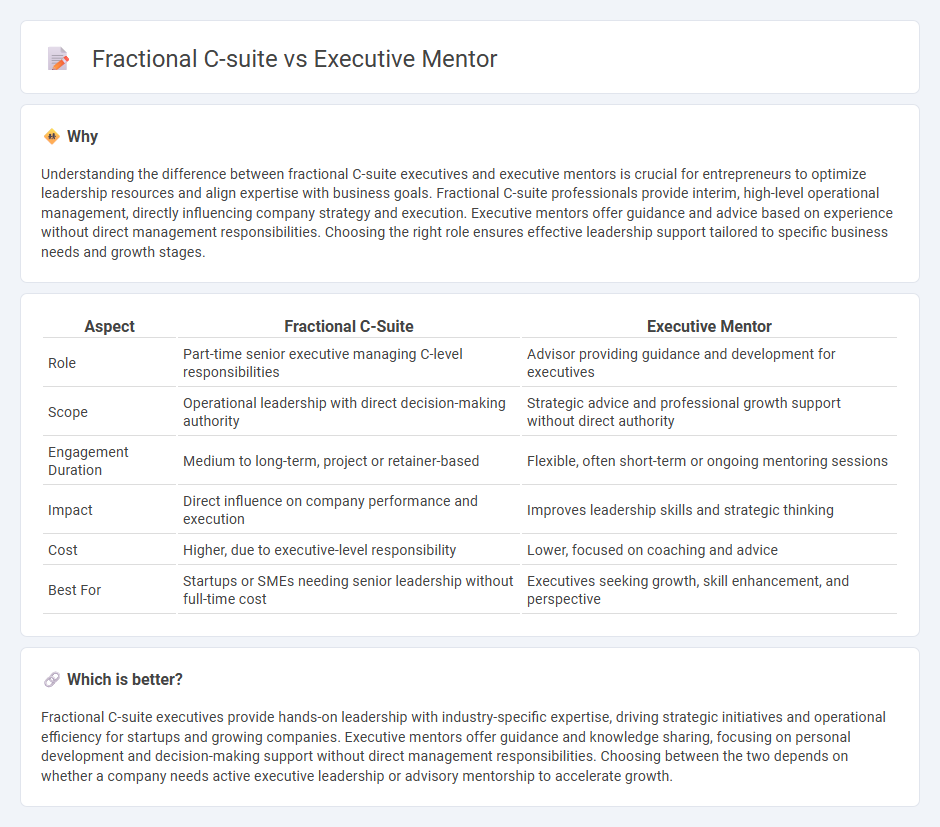
Entrepreneurship often demands expert guidance, which can come from either a fractional C-suite executive or an executive mentor, each offering distinct advantages. Fractional C-suite executives provide hands-on leadership with specific operational responsibilities, while executive mentors offer strategic advice and personal growth insights without direct management. Explore the differences to determine which approach best accelerates your business success.
Why it is important
Understanding the difference between fractional C-suite executives and executive mentors is crucial for entrepreneurs to optimize leadership resources and align expertise with business goals. Fractional C-suite professionals provide interim, high-level operational management, directly influencing company strategy and execution. Executive mentors offer guidance and advice based on experience without direct management responsibilities. Choosing the right role ensures effective leadership support tailored to specific business needs and growth stages.
Comparison Table
| Aspect | Fractional C-Suite | Executive Mentor |
|---|---|---|
| Role | Part-time senior executive managing C-level responsibilities | Advisor providing guidance and development for executives |
| Scope | Operational leadership with direct decision-making authority | Strategic advice and professional growth support without direct authority |
| Engagement Duration | Medium to long-term, project or retainer-based | Flexible, often short-term or ongoing mentoring sessions |
| Impact | Direct influence on company performance and execution | Improves leadership skills and strategic thinking |
| Cost | Higher, due to executive-level responsibility | Lower, focused on coaching and advice |
| Best For | Startups or SMEs needing senior leadership without full-time cost | Executives seeking growth, skill enhancement, and perspective |
Which is better?
Fractional C-suite executives provide hands-on leadership with industry-specific expertise, driving strategic initiatives and operational efficiency for startups and growing companies. Executive mentors offer guidance and knowledge sharing, focusing on personal development and decision-making support without direct management responsibilities. Choosing between the two depends on whether a company needs active executive leadership or advisory mentorship to accelerate growth.
Connection
Fractional C-suite executives and executive mentors both provide high-level leadership insights tailored to emerging companies, enabling scalable growth without the cost of full-time salaries. These roles facilitate strategic decision-making and leadership development by leveraging extensive industry experience while focusing on specific business needs. Entrepreneurs benefit from this model through agile guidance and mentorship that drives innovation and operational efficiency.
Key Terms
Guidance
Executive mentors provide personalized guidance to senior leaders, enhancing their strategic decision-making and leadership skills through experience-based advice. Fractional C-suite executives dedicate part-time expertise by actively managing key business functions, driving operational results and implementing strategic initiatives. Discover the nuances and benefits of these approaches to elevate your leadership journey.
Interim Leadership
Executive mentors provide guidance and skill development tailored to individual leaders, focusing on growth and long-term career impact. Fractional C-suite executives offer interim leadership by temporarily filling key roles such as CEO, CFO, or COO to drive strategic initiatives and stabilize organizations during transitions. Explore the distinct advantages of interim leadership to determine the best fit for your organization's needs.
Strategic Oversight
Executive mentors provide personalized guidance to senior leaders, helping refine strategic thinking and decision-making skills for long-term growth. Fractional C-suite executives take on temporary leadership roles within organizations, delivering hands-on strategic oversight and operational expertise during critical transitions or growth phases. Explore how blending these approaches can enhance your organization's strategic effectiveness.
Source and External Links
Tools for Executives in Mentoring Programs - DCPAS - Executive mentoring helps retain and develop high performers while executives themselves grow leadership skills, with emphasis on preparation and training of both mentors and mentees.
Executive Mentoring | Russell Reynolds Associates - Executive mentoring connects leaders with former C-suite executives who provide strategic guidance and insights to accelerate leadership effectiveness and decision-making.
Executive Mentoring Programs To Guide Future Leaders - Qooper - Executive mentoring is a formal program helping senior executives and new leaders develop leadership, strategic planning, and career advancement skills through experienced mentors.
 dowidth.com
dowidth.com